
No data
Do you want to know which is the better broker between eToro and Tickmill ?
In the table below, you can compare the features of eToro , Tickmill side by side to determine the best fit for your needs.
EURUSD: 0.1
XAUUSD: 0.4
Long: -6.19
Short: 2.66
Long: -32.8
Short: 20.86
You can determine the reliability and credibility of a broker by checking four factors:
1.Forex broker introduction。
2.Are the transaction costs and expenses of etoro, tickmill lower?
3.Which broker is safer?
4.Which broker provides better trading platform?
Based on these four factors, we can compare which is reliable. We have broken down the reasons as follows:
| eToro | Basic Information |
| Founded in | 2007 |
| Headquarters | United Kingdom |
| Regulations | CySEC, FCA, ASIC |
| Tradable Assets | Stocks, Cryptocurrencies, Currencies, Commodities, ETFs |
| Minimum Deposit | $10 |
| Trading Fees | Commission-free trading, Spreads from 0.75 pips on EUR/USD |
| Non-Trading Fees | Withdrawal fee of $5, Inactivity fee of $10/month after 12 months of inactivity |
| Leverage | Up to 1:30 for retail clients, up to 1:400 for professional clients |
| Trading Platforms | eToro proprietary platform, MetaTrader 4 |
| Mobile Trading | Yes, available on iOS and Android |
| Customer Support | 24/5 live chat, email support |
| Educational Resources | Social trading, educational videos, blog articles, eToro Academy |
| Demo Account | Yes, unlimited time |
| Other Features | CopyTrader, Popular Investor Program, eToro Wallet |
eToro is a multi-asset social trading platform that has gained widespread popularity among investors, traders, and social media enthusiasts since its inception in 2007. It offers users access to a wide range of financial instruments, including stocks, cryptocurrencies, forex, indices, and commodities, among others. The platform provides a user-friendly interface that caters to both novice and experienced traders alike, making it one of the most popular trading platforms on the market.
One of eToro's standout features is its social trading capabilities, which allow users to copy the trades of successful traders and build their investment portfolios. The platform has a large community of traders who share insights, strategies, and knowledge, making it an excellent learning resource for traders looking to improve their skills.
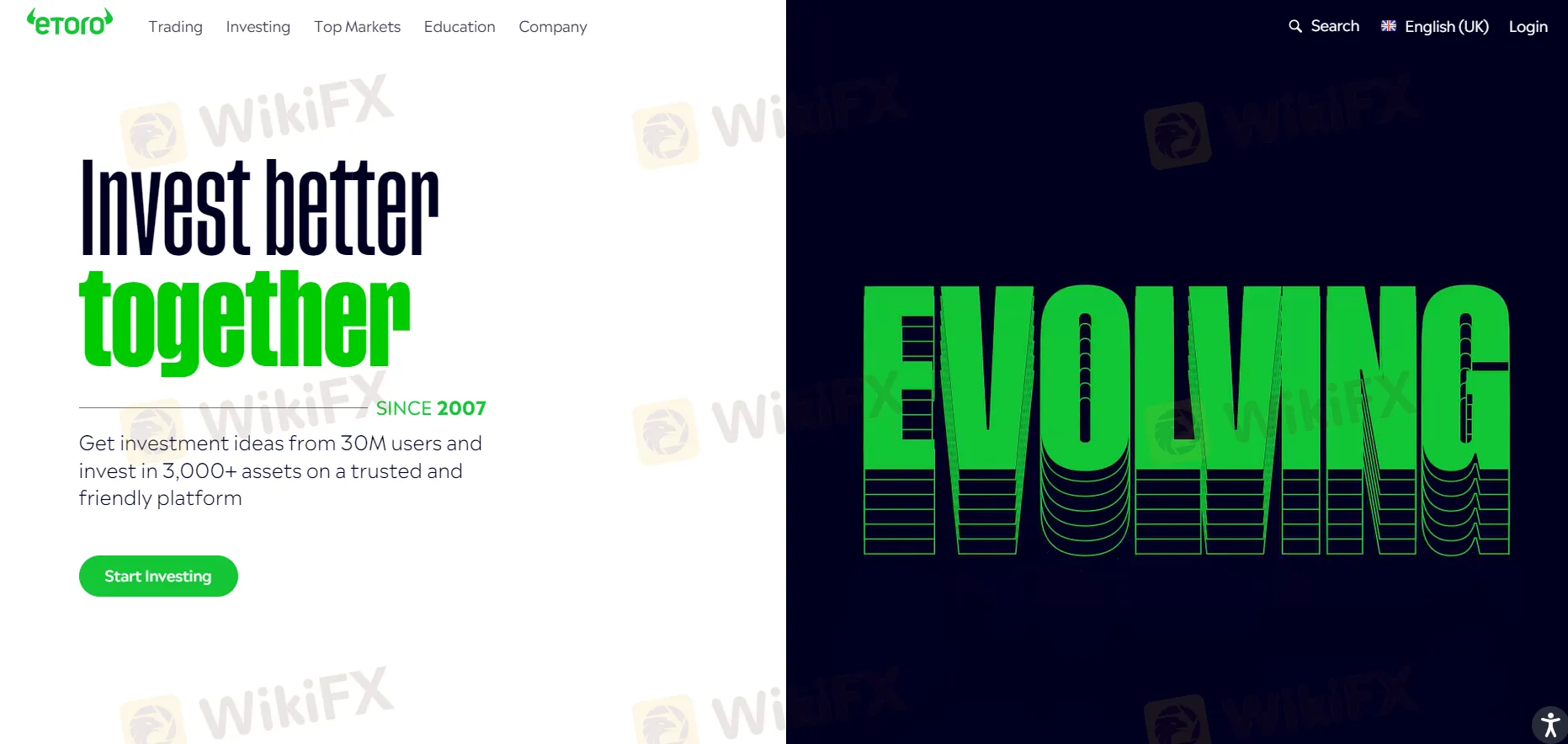
eToro is a legitimate and regulated online brokerage firm that has been operating since 2007. It is licensed and regulated by several reputable financial authorities, including the Financial Conduct Authority (FCA) in the UK, the Australian Securities and Investments Commission (ASIC), and the Cyprus Securities and Exchange Commission (CySEC). The company is also a member of the Investor Compensation Fund, which provides additional protection for traders' funds. However, as with any investment platform, there are risks involved in trading, and traders should always be aware of the potential risks and take steps to protect their investments.
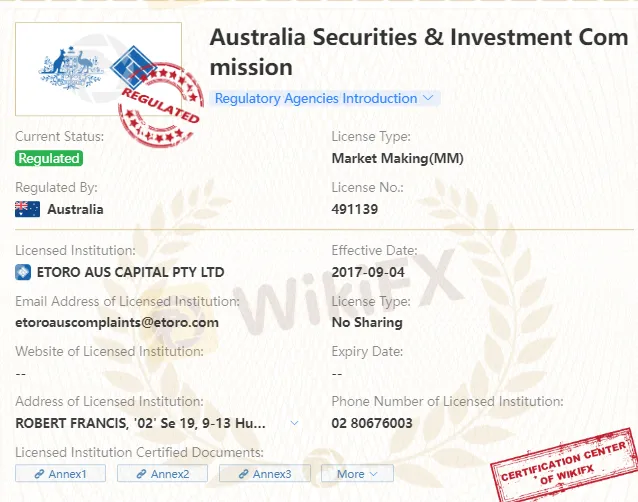
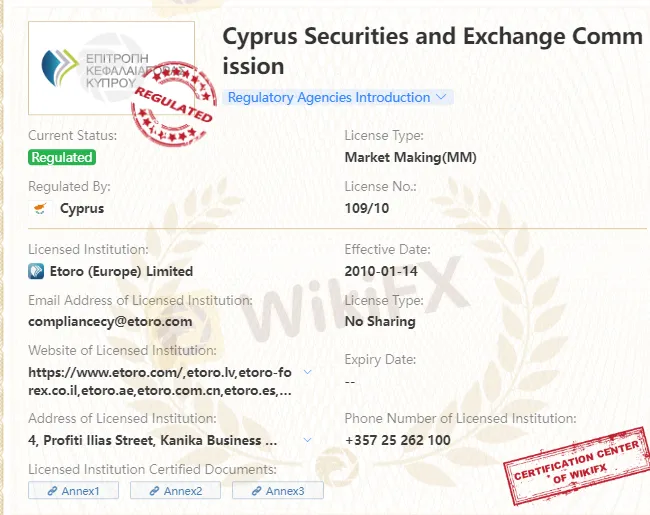
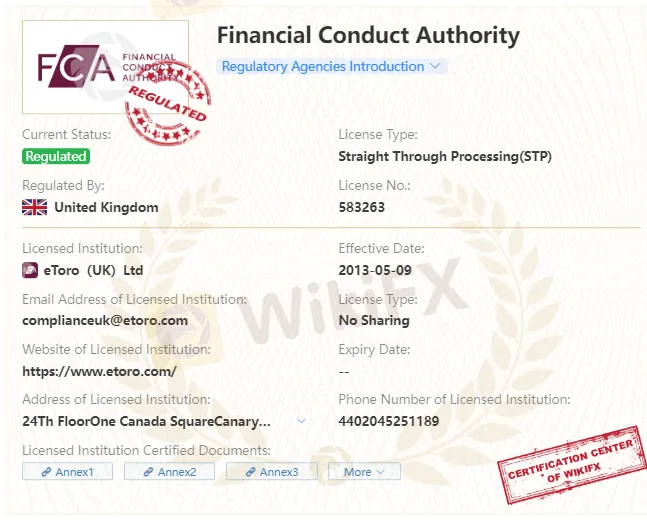
eToro's user-friendly interface, range of trading assets, and social trading features have made it popular among both beginner and experienced traders. However, as with any trading platform, eToro has its pros and cons, which potential users should consider before signing up. In this section, we will discuss the advantages and disadvantages of using eToro as a trading platform.
| Pros | Cons |
| User-friendly and easy-to-use platform | Higher spreads compared to some other brokers |
| Regulated by reputable financial authorities | Limited range of tradable assets |
| Copy trading and social trading features | Limited research and analysis tools |
| Wide range of payment methods | Inactivity fee charged after 12 months of inactivity |
| Commission-free trading on stocks and ETFs | Withdrawal fee of $5 |
| Demo account available for practice | Limited customer support options |
Market Instruments
eToro offers a wide range of financial instruments for traders to choose from, covering various markets globally. Traders can access more than 2,400 assets, including popular currencies, commodities, indices, and stocks from exchanges around the world. Furthermore, eToro enables traders to trade cryptocurrency, such as Bitcoin and Ethereum, which has become a popular asset class in recent years due to its high volatility and potential for substantial profits. With this wide range of instruments available, traders can diversify their portfolios and explore various markets to find the best investment opportunities.

| Pros | Cons |
| Wide variety of assets including stocks, cryptocurrencies, commodities, forex, and more | Limited selection of options and futures contracts |
| Commission-free trading on most instruments | Limited research tools for fundamental analysis |
| Availability of social trading, allowing for copy trading and following other traders' strategies | Limited access to less popular or niche assets |
| Option to trade fractional shares for stocks, making it accessible to investors with small capital | Limited trading hours on certain assets, such as cryptocurrencies |
| Lack of transparency in pricing structure for some assets |
eToro provides traders with two primary types of accounts to choose from, namely the Retail and Professional accounts. These account types differ in various aspects, such as trading features, account requirements, leverage limits, and the level of regulatory protection they offer.
eToro's Retail account is suitable for most traders and investors. This account type requires a minimum deposit of $500 and provides access to all eToro's trading instruments, including cryptocurrencies, stocks, ETFs, commodities, and more. Retail account holders can also benefit from eToro's social trading features, which allow users to follow and copy other successful traders on the platform. However, retail account holders are limited to a maximum leverage of 1:30, as per regulatory requirements.
eToro's Professional account is designed for experienced traders who meet certain criteria, such as having a minimum of two years of trading experience and meeting certain financial thresholds. This account type provides access to higher leverage of up to 1:400, and allows users to benefit from reduced margin requirements and negative balance protection. However, professional account holders are not eligible for certain investor protection rights, such as compensation schemes, as they are deemed to have a higher level of trading knowledge and experience.

| Aspects | Pros | Cons |
| Account Types | Offers both retail and professional accounts | Professional accounts require certain qualifications |
| Minimum Deposit | Low minimum deposit requirement for retail account | High minimum deposit requirement for professional account |
| Commission | No commission on trades for most assets | Higher spreads compared to other brokers |
| Leverage | Up to 1:30 for major currency pairs | Limited leverage options for professional accounts |
| Platform | User-friendly platform with social trading features | Limited customization options |
| Customer Support | 24/7 customer support in multiple languages | Phone support only available during market hours |
To open an account with eToro, you need to follow these steps:
Go to the eToro website and click on the “Join Now” button.
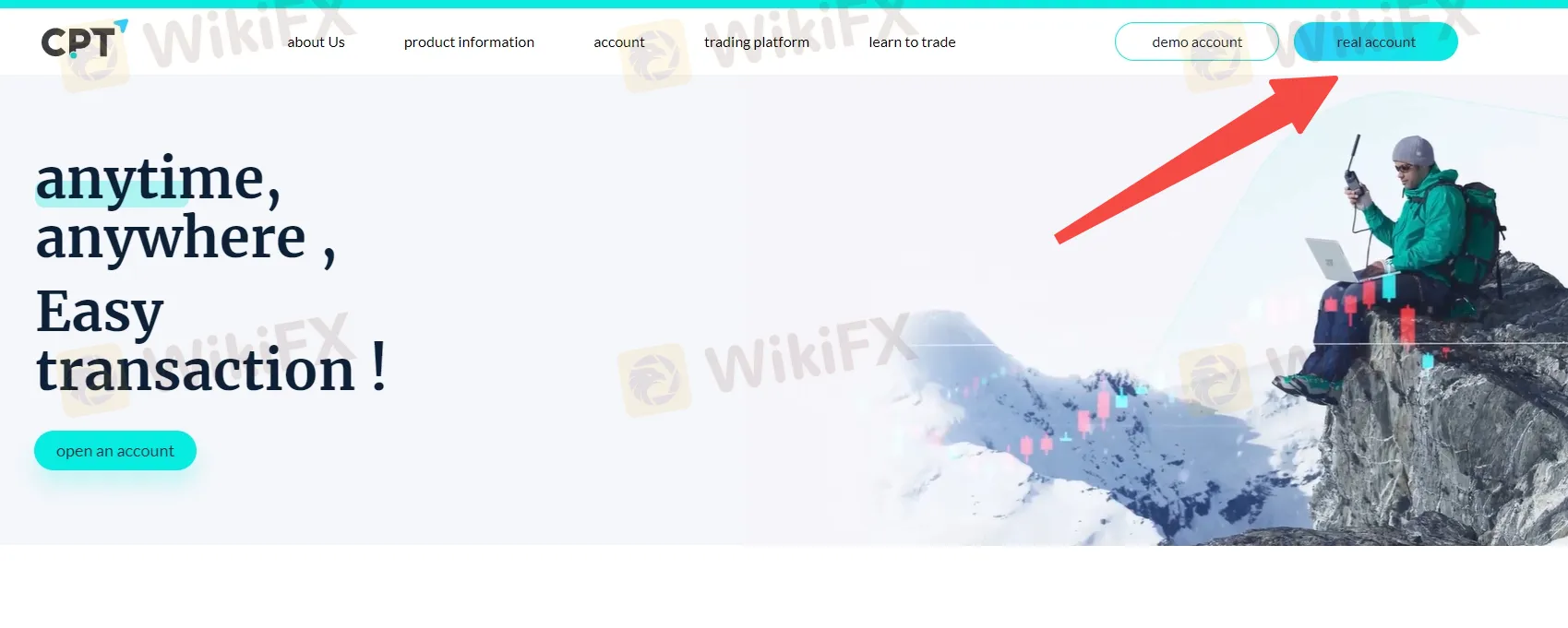
Enter your personal information, including your name, email address, and phone number.
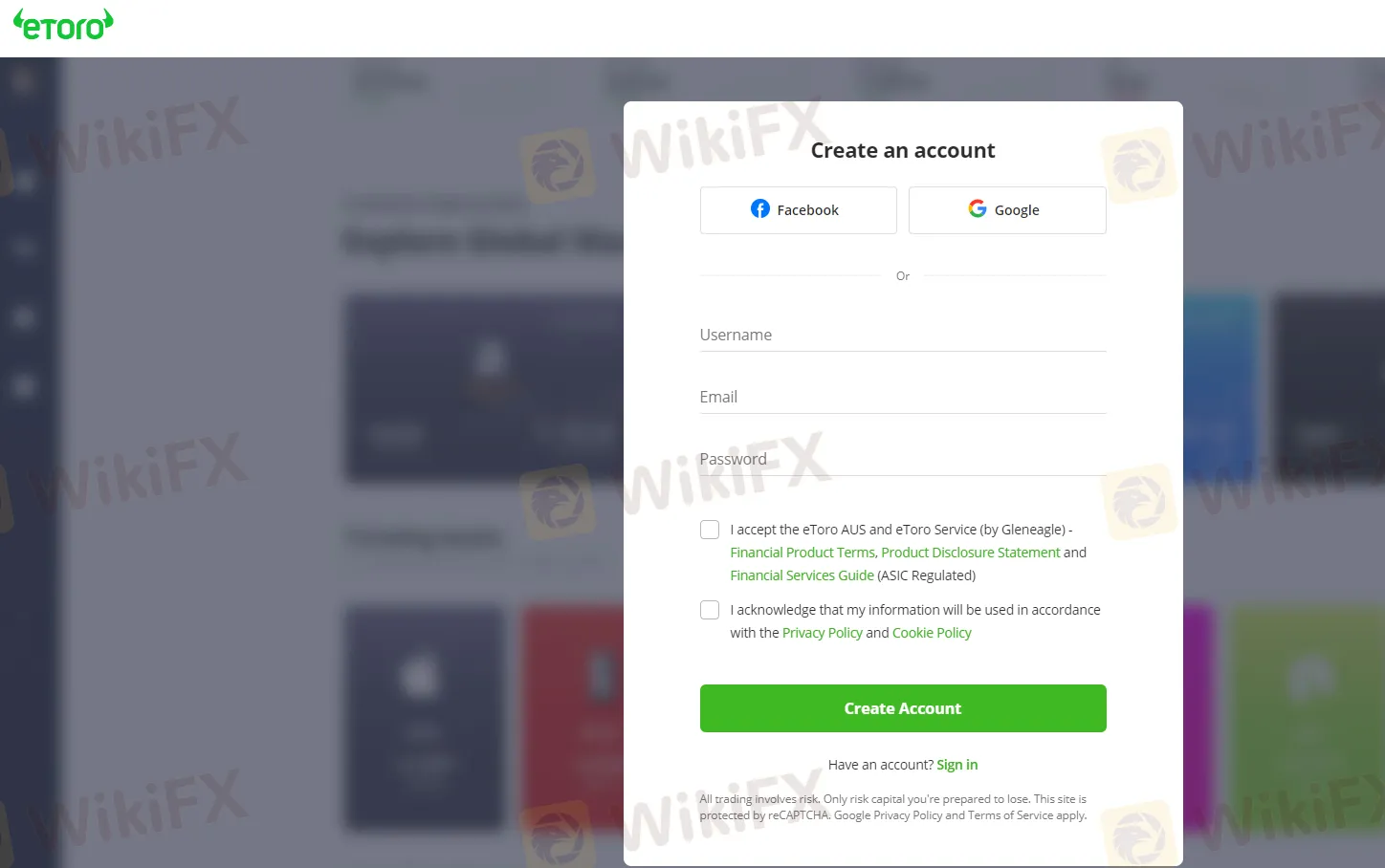
Verify your email address by clicking on the verification link sent to your email. Provide additional information, including your date of birth, address, and tax ID number. Agree to the terms and conditions and submit your application.
Wait for eToro to review and approve your account, which usually takes a few minutes to a few business days.
After approval, you can fund your account with preferable payment methods and then start your real trading with this broker.
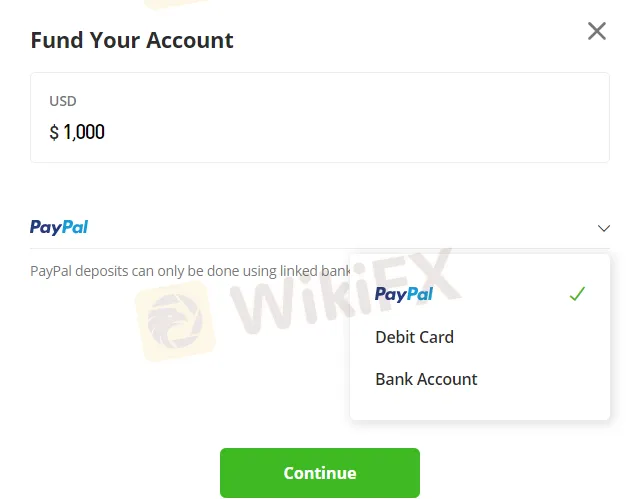
eToro offers a demo account for traders who want to practice trading strategies without risking real money. The eToro demo account provides $100,000 in virtual money and is valid for an unlimited amount of time, allowing traders to familiarize themselves with the platform and practice their trading skills.
To open a demo account, traders can simply sign up for an eToro account and select the option to use the demo account. It's important to note that the eToro demo account does not require any deposit or funding, making it a risk-free way to test out the platform.
When using the demo account, traders should keep in mind that the virtual money provided is not real, and any profits or losses made are also not real. It's also important to note that while the demo account provides a good introduction to the platform, it may not accurately reflect the actual market conditions and trading experience.
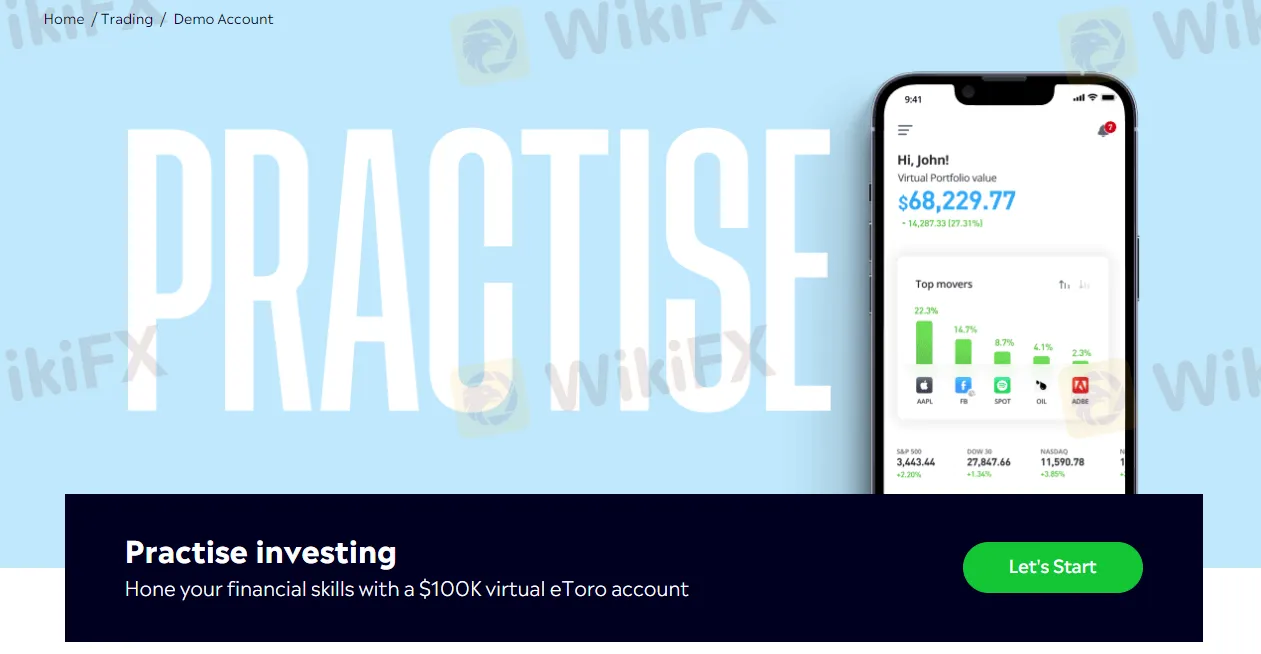
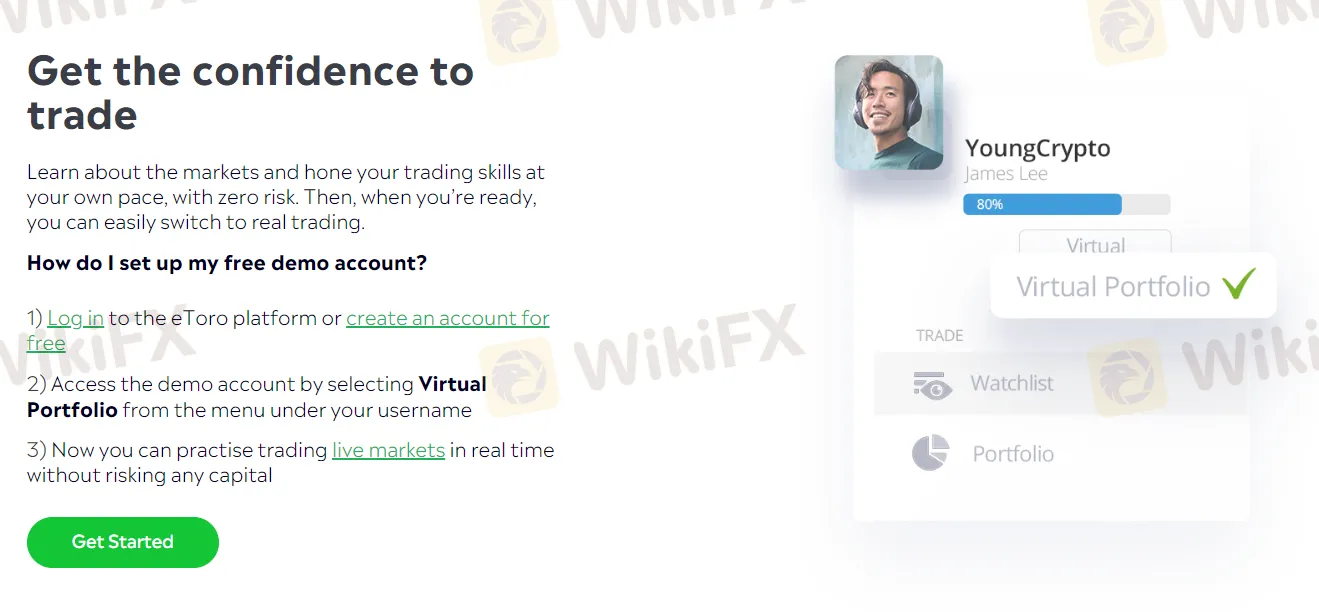
eToro offers leverage for trading various financial instruments. The maximum leverage provided by eToro varies depending on the instrument and the jurisdiction of the client. For example, for major forex pairs, eToro offers leverage up to 1:30 for retail clients and up to 1:400 for professional clients. For commodities such as gold and silver, leverage can be up to 1:20 for retail clients and up to 1:100 for professional clients. For stocks, eToro offers leverage up to 1:5 for both retail and professional clients. It is noted that high leverage can amplify your potential returns, but more importantly, it can increase your risks.
eToro's spreads vary depending on the asset being traded. The platform charges variable spreads, which means that the spread can widen or narrow depending on market conditions. The typical spread for major currency pairs such as EUR/USD and GBP/USD is around 3 pips during normal market conditions. However, this can vary depending on market volatility and liquidity.
For other assets, such as cryptocurrencies and commodities, eToro's spreads are generally higher. For example, the spread for Bitcoin can range from 0.75% to 5% depending on market conditions.

| Pros | Cons |
| Zero commission on stock and ETF trading | Wider spreads compared to other brokers |
| Competitive spreads on major forex pairs | Overnight fees charged on leveraged positions |
| No hidden fees or surprises | Limited selection of exotic currency pairs |
| Transparent pricing | Higher spreads on cryptocurrencies |
| Tight spreads on commodities and indices | Spreads can widen during volatile market conditions |
In addition to spreads and commissions, eToro also imposes a few non-trading fees that traders should take into consideration before trading on this platform. These fees include:
Withdrawal fee: eToro charges a withdrawal fee of $5 per withdrawal. This fee is relatively low compared to other brokers.
Inactivity fee: If you don't log in to your eToro account for 12 months, an inactivity fee of $10 per month will be charged to your account. This fee is charged until you log in again or until your account balance reaches zero.
Overnight fees: eToro charges overnight fees or rollover fees for positions held open overnight. The amount of the fee depends on the instrument traded, the direction of the position, and the size of the position.
Currency conversion fee: If you deposit funds in a currency different from the base currency of your account, eToro charges a currency conversion fee. The fee is 0.5% of the deposited amount, and it's calculated based on the exchange rate at the time of the conversion.
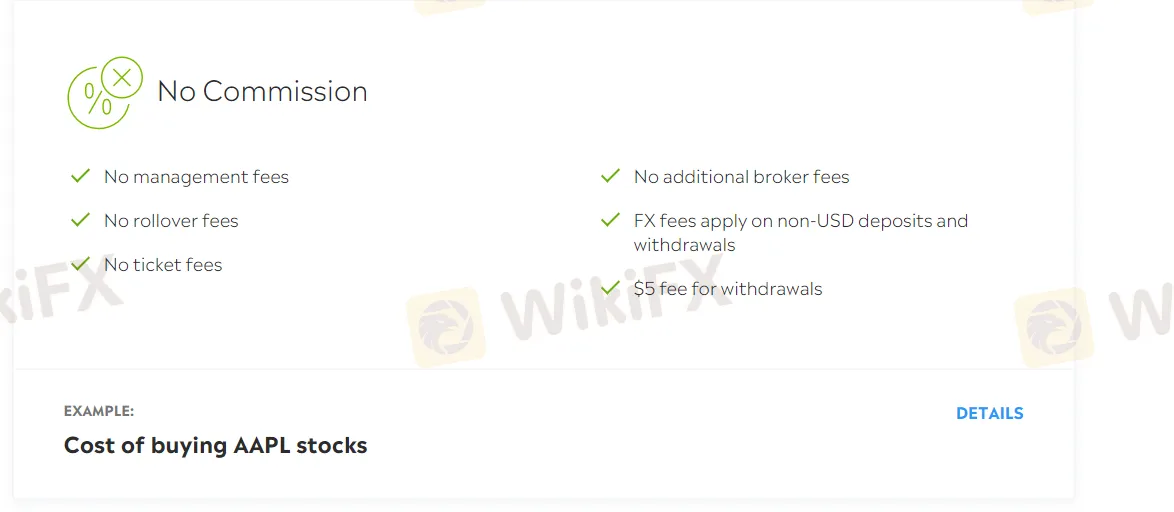
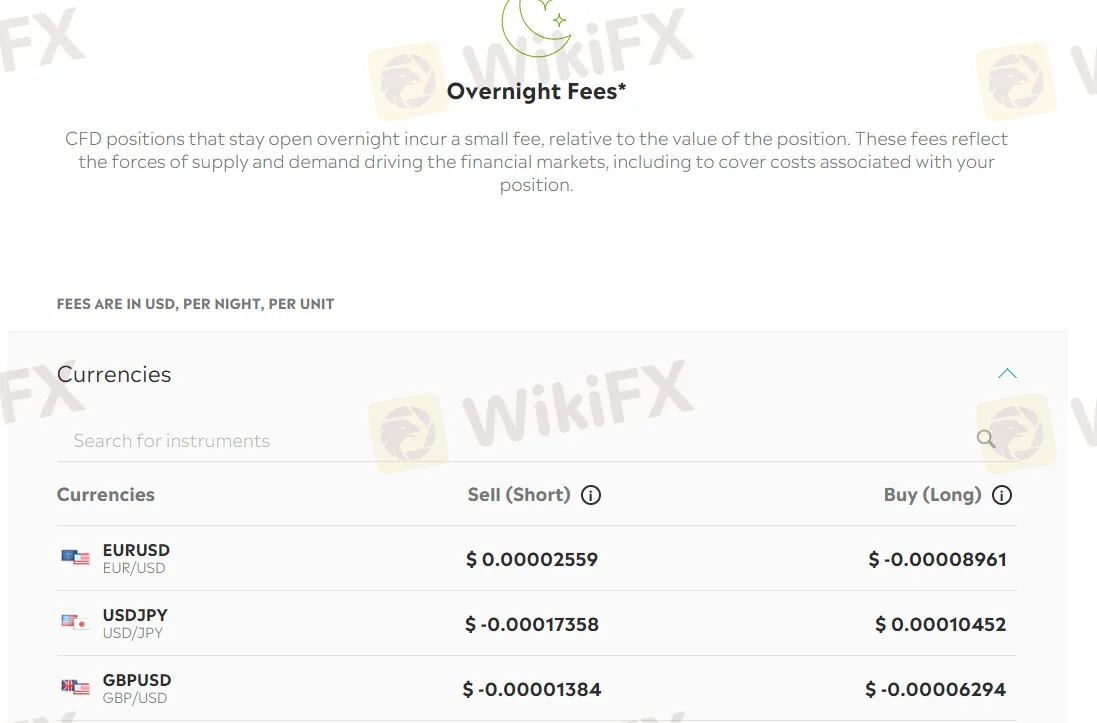
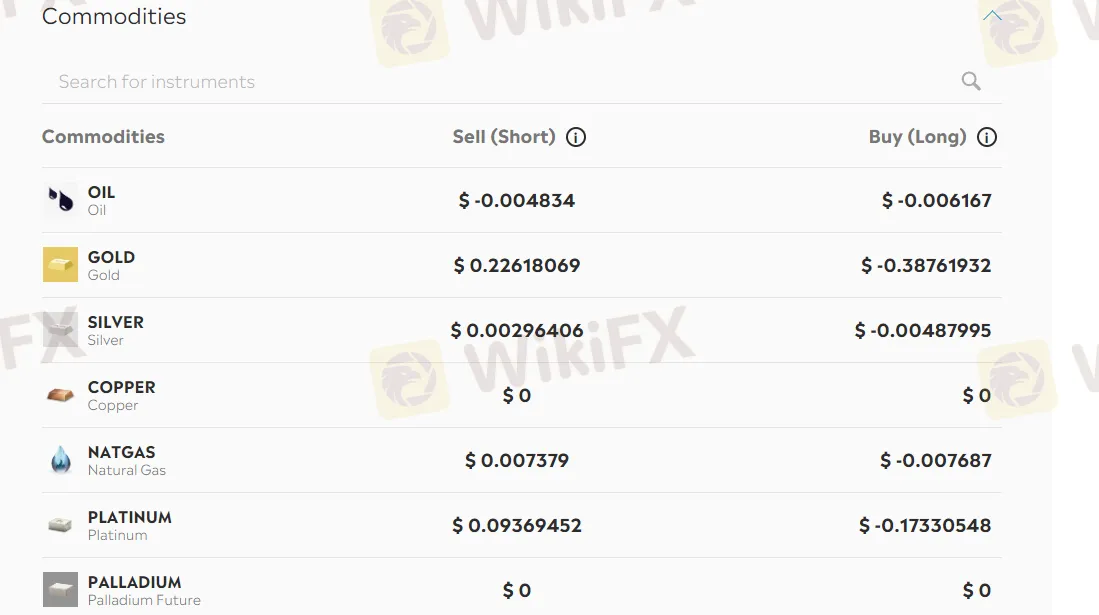

| Pros | Cons |
| No commissions on stock and ETF trading | Higher spreads compared to other brokers |
| No deposit fees | High withdrawal fees |
| No account maintenance fees | Inactivity fee after 12 months of inactivity |
| No fees for using the CopyTrader feature | Limited payment methods |
| No fees for currency conversion | Overnight fees for positions held overnight |
| High fees for using PayPal as a payment method |
eToro offers its proprietary trading platform, which is designed to be user-friendly and intuitive, particularly for novice traders. The platform provides a variety of tools and features, including real-time market data, advanced charting tools, and an easy-to-use order entry system.
One of the most notable features of the eToro platform is its social trading functionality, which allows users to follow and copy the trades of successful traders. This feature is particularly appealing to new traders who may lack the knowledge or experience to make their own trades.
In addition to its proprietary platform, eToro also supports the popular MetaTrader 4 (MT4) platform, which is widely used by traders around the world. MT4 is known for its advanced charting capabilities, extensive library of technical indicators, and the ability to automate trading strategies through the use of Expert Advisors (EAs).
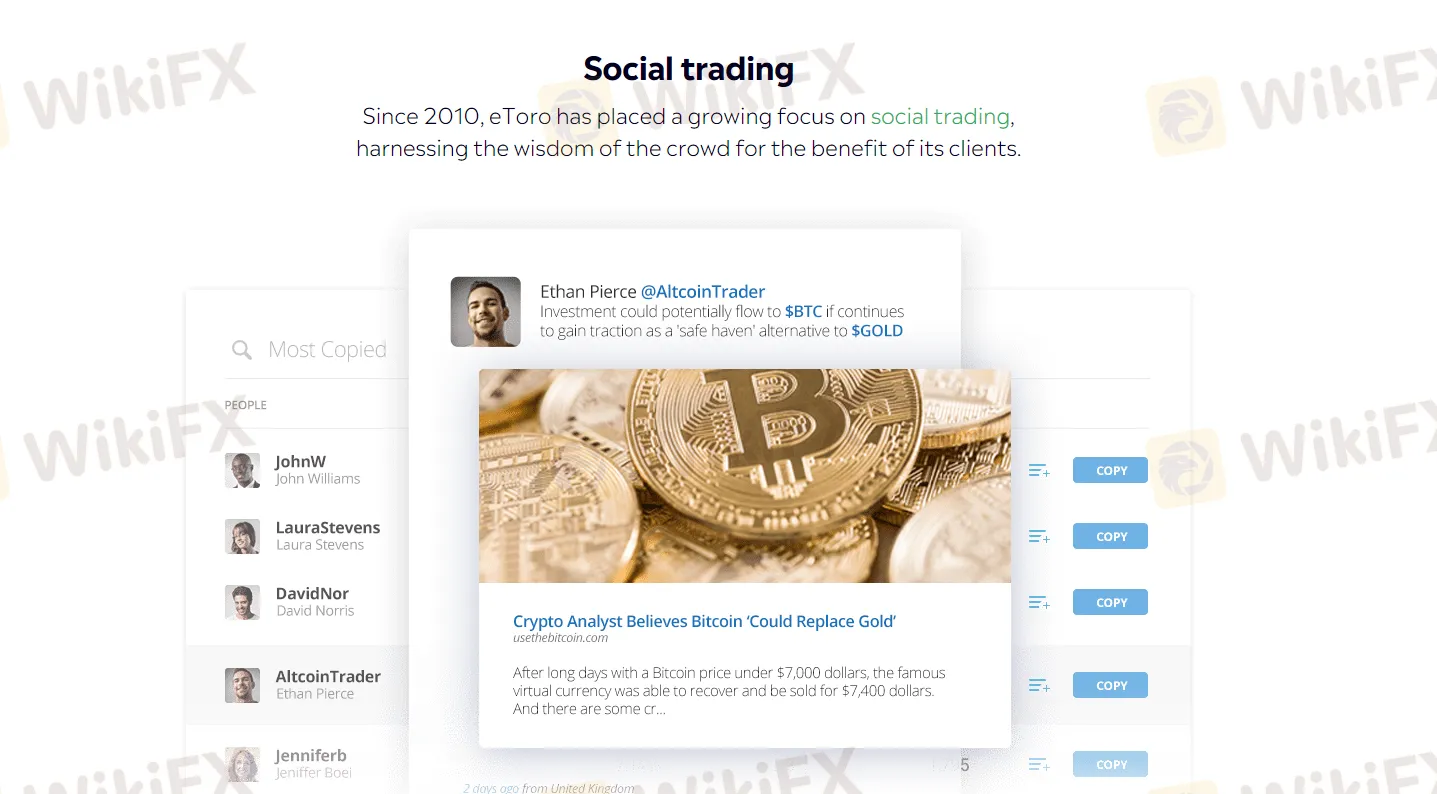
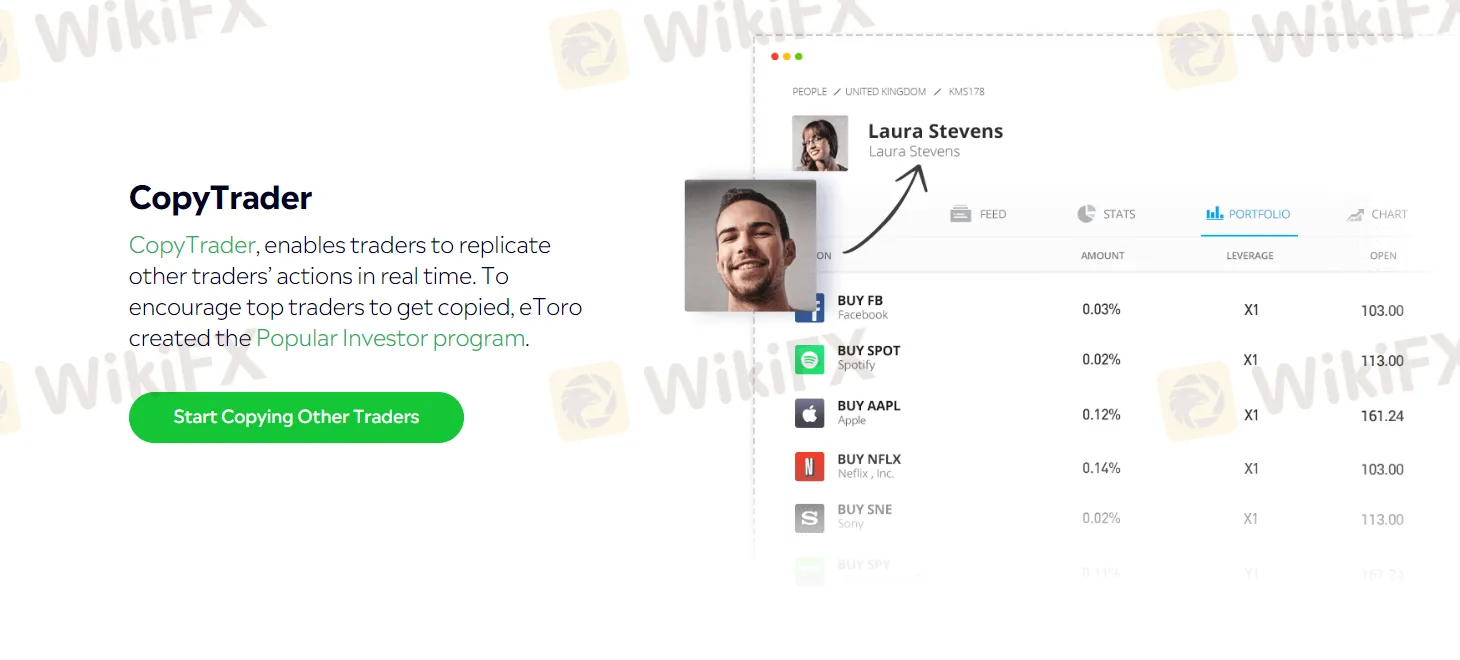
Here is a comparison table of the trading platform offered by eToro, FP Markets and Exness:
| Broker | Trading Platform | Desktop | Web-based | Mobile |
| eToro | eToro Platform | ✔️ | ✔️ | ✔️ |
| FP Markets | MetaTrader 4 (MT4) | ✔️ | ✔️ | ✔️ |
| Exness | MetaTrader 4 (MT4) | ✔️ | ✔️ | ✔️ |
eToro accepts multiple payment methods, including credit/debit cards, bank transfers, and e-wallets such as PayPal, Neteller, and Skrill. The minimum deposit amount is $10, which is relatively low compared to other brokers in the industry. Deposits are usually processed instantly or within one business day, depending on the payment method. eToro does not charge any deposit fees, but some payment providers may have their own fees.
eToro allows you to withdraw funds using the same payment methods as deposits.The minimum withdrawal amount is $30, and there is a withdrawal fee of $5.Withdrawals are usually processed within one business day, but it may take longer for bank transfers.Before making a withdrawal, you need to verify your identity and complete the necessary KYC (Know Your Customer) procedures. eToro also has a policy of returning funds to the original payment method used for deposits, whenever possible.
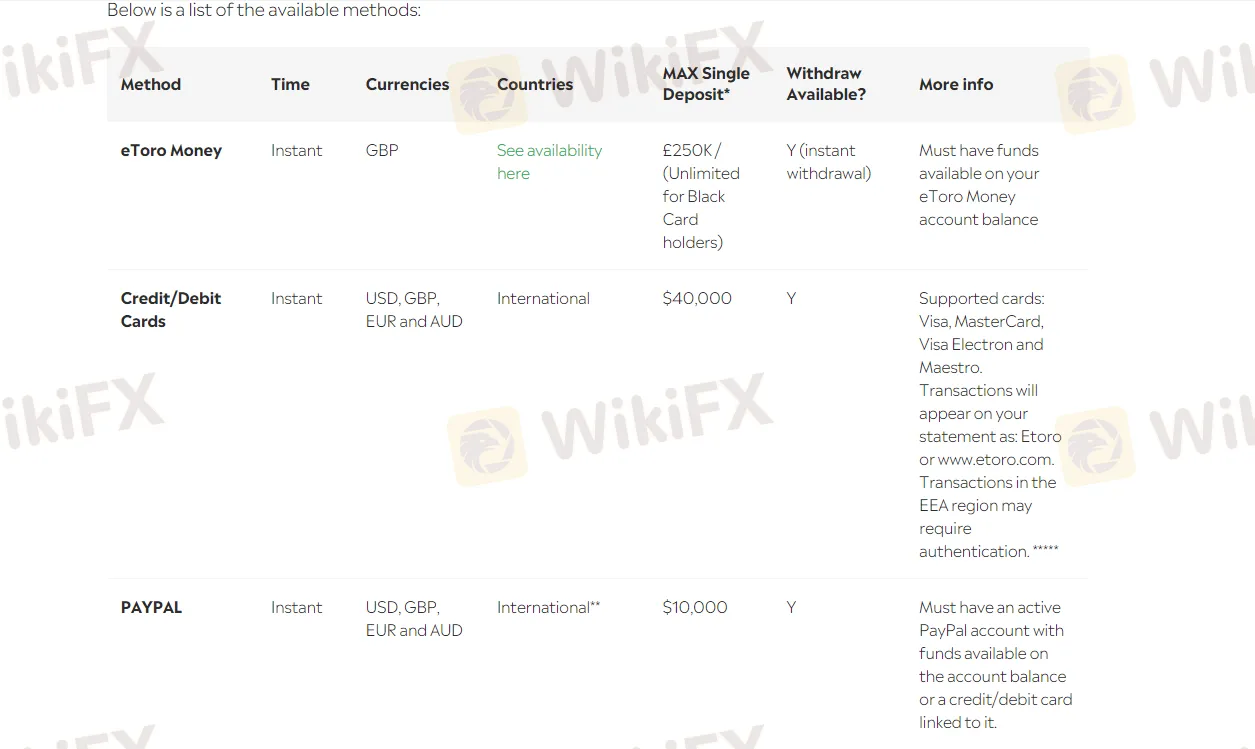
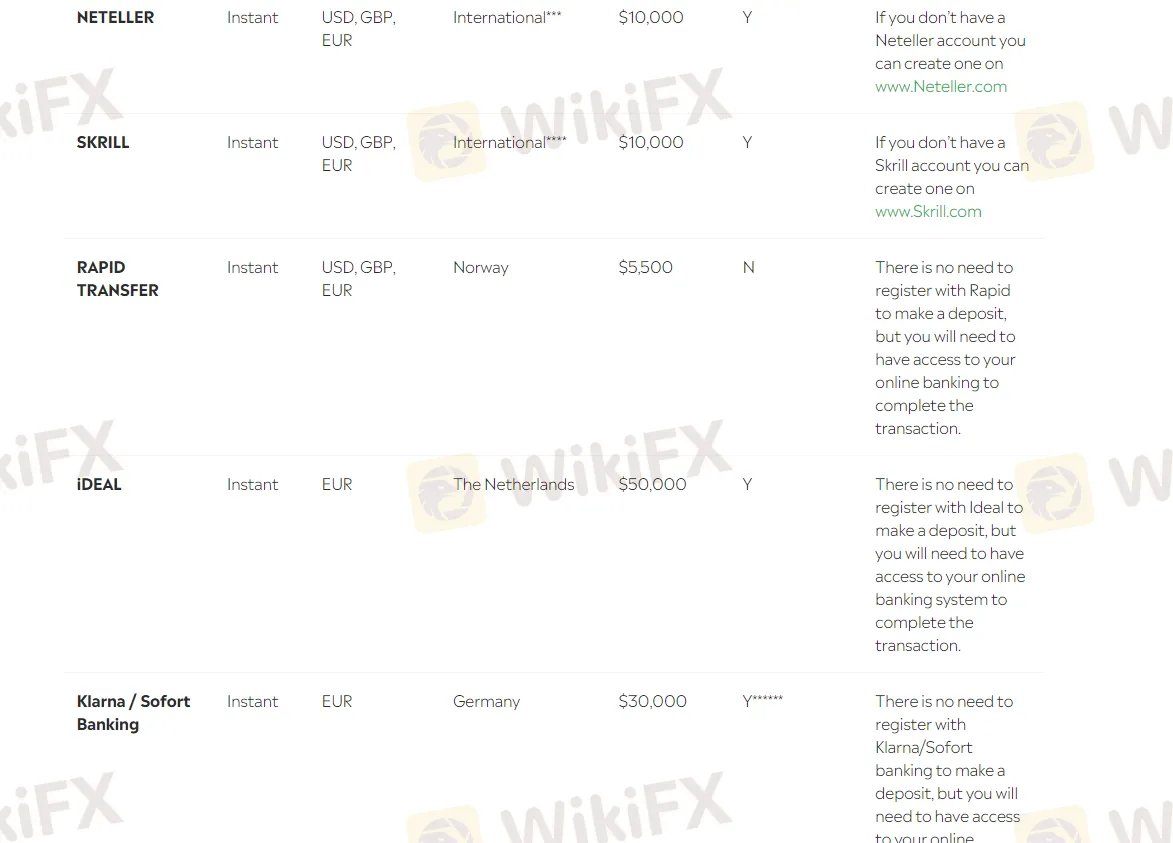
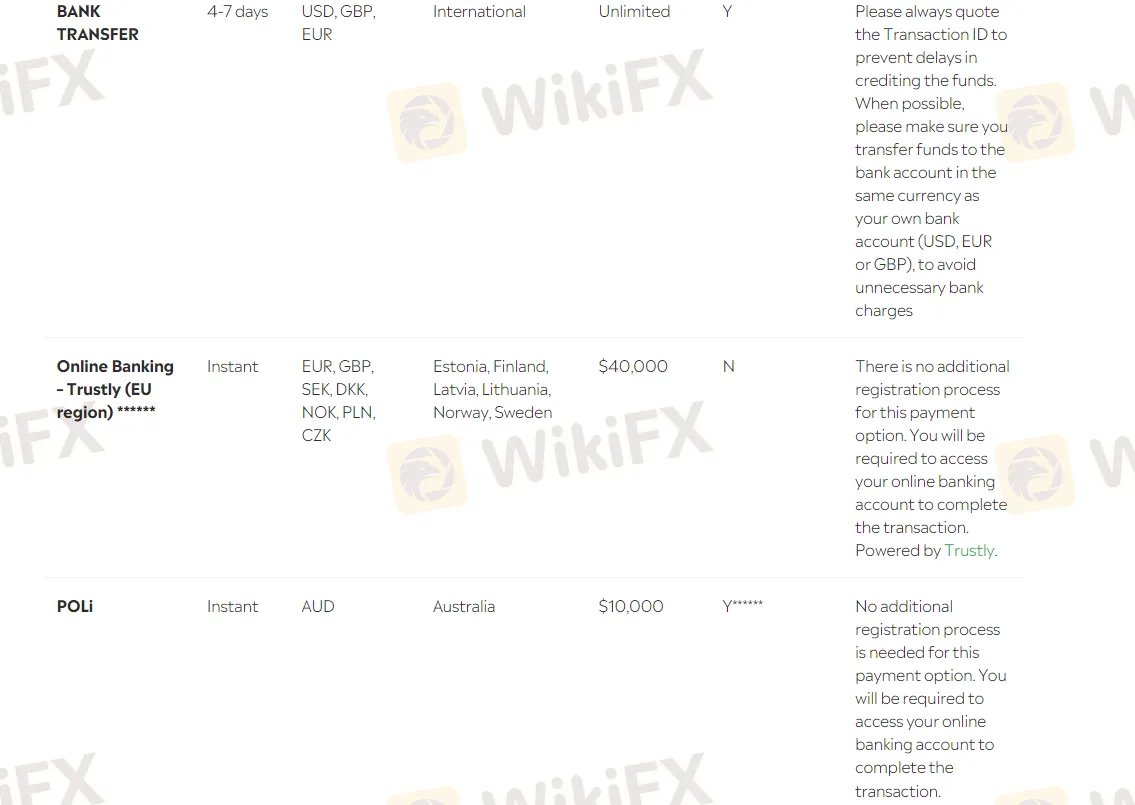

| Pros | Cons |
| Wide range of payment methods available including credit/debit cards, PayPal, and bank transfer | Withdrawal fee of $5 per transaction |
| Quick and easy deposit process with most methods being processed instantly | Minimum withdrawal amount of $30 |
| No deposit fees charged by eToro | Limited number of currencies available for deposits and withdrawals |
| Supports deposits and withdrawals in multiple currencies | Withdrawal processing time can take up to 7 business days |
| Allows users to set up multiple payment methods for convenience | Third-party fees may be charged by payment processors |
| Negative balance protection ensures that users cannot lose more than they have deposited | Users may need to provide additional verification documents for withdrawals |
Customer support is an important aspect of any online brokerage firm, and eToro is no exception. eToro offers various channels for customers to get in touch with its support team. These channels include:
Live chat: This is available 24/5, Monday to Friday. It is the fastest and most efficient way to get support.
Email: Customers can send an email to the eToro support team. The response time is usually within 24 hours.
Phone: Customers can also call the support team during office hours. eToro provides local phone numbers for various countries.
Social media: eToro has a presence on various social media platforms, including Twitter and Facebook. Customers can use these platforms to get in touch with the support team.
FAQ section: eToro offers a comprehensive FAQ section on their website that covers a wide range of topics related to their services, trading, account management, and more. The FAQ section is organized into categories, making it easy for users to find answers to their questions quickly.
When it comes to educational resources, Toro offers a variety of educational content to help traders improve their skills and knowledge of the financial markets.
These resources include:
eToro Academy: This is an online education portal that provides traders with a wide range of educational materials, including articles, videos, webinars, and courses on various topics such as trading strategies, market analysis, risk management, and more.
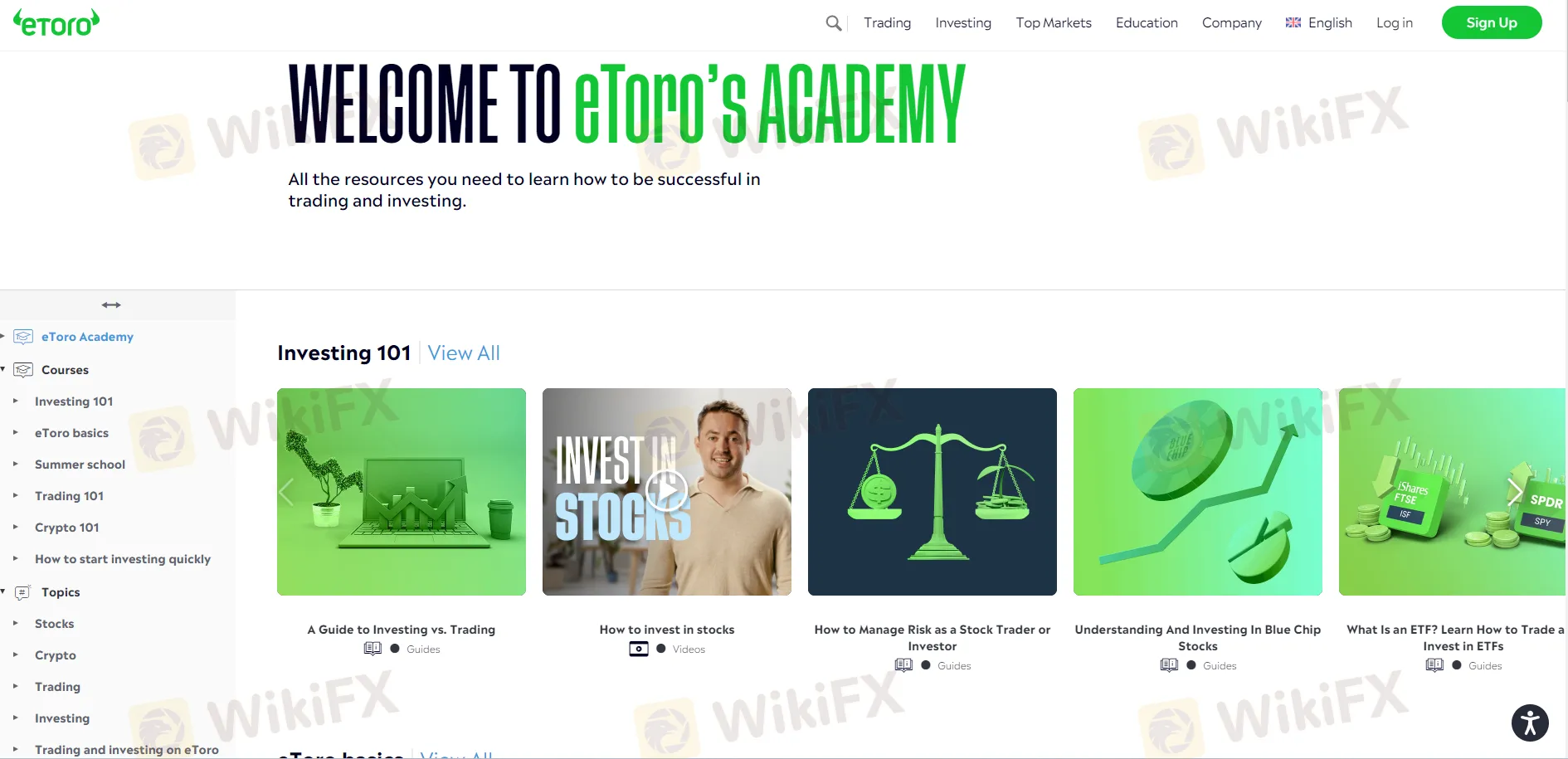
Trading Guides: eToro also offers a series of trading guides that provide in-depth information on various trading topics, including stocks, commodities, currencies, and indices.
Market News and Analysis: eToro provides traders with up-to-date news and analysis on the financial markets. This includes daily market updates, weekly market analysis, and other educational content.
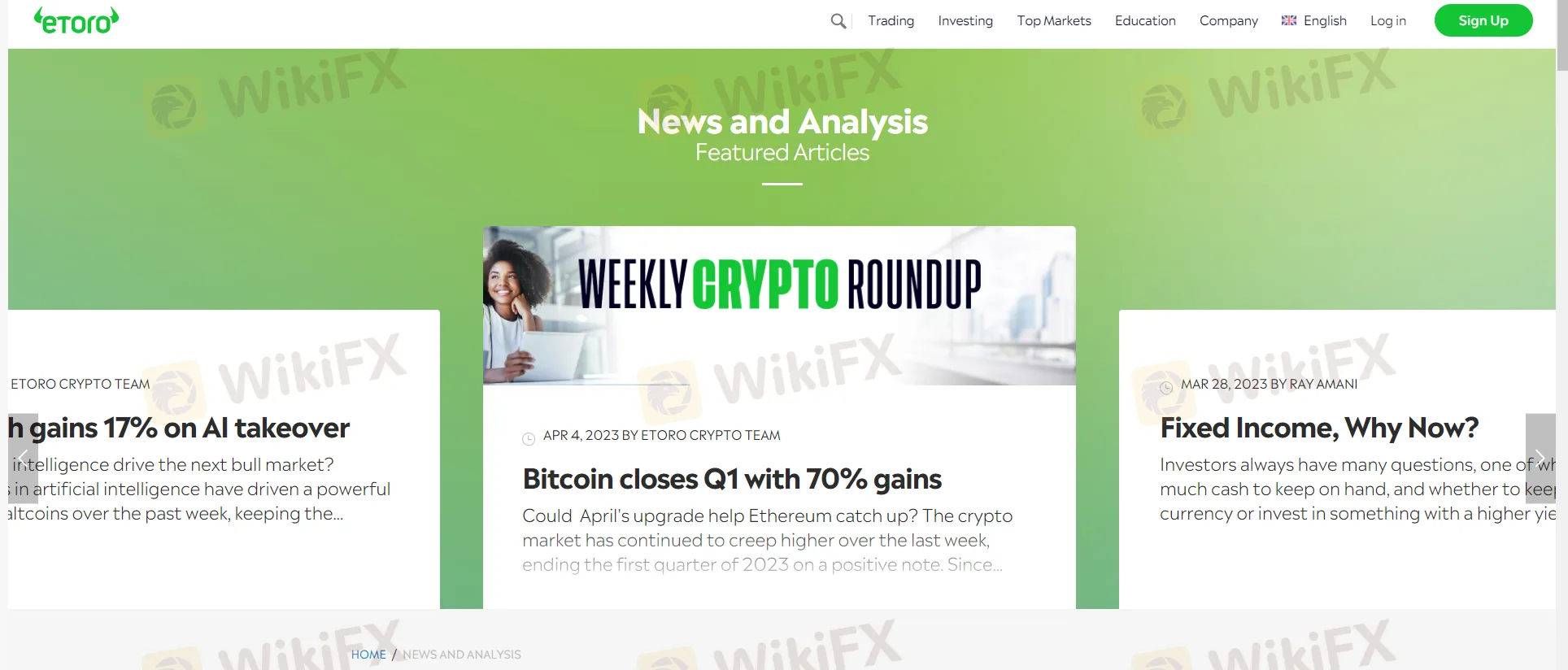
Blog: eToro has a blog that provides traders with the latest news, market analysis, and trading tips.
Virtual Portfolio: eToro offers a virtual portfolio feature that allows traders to practice trading without risking real money. This is a great way for beginners to gain experience and test out their trading strategies before trading with real money. Here is an instructional video for users to know clearly what Virtual Portfolio is:https://www.youtube.com/watch?v=GWK7uQ98KpM.
Overall, eToro is a reputable and user-friendly online trading platform that offers a wide range of financial instruments and trading options to its clients. Its innovative social trading features, intuitive platform, and excellent customer service make it an attractive choice for both beginner and experienced traders. However, it does have some drawbacks, such as relatively high fees, limited research tools, and a lack of advanced charting capabilities.
FAQs
Q: Is eToro a regulated broker?
A: Yes, eToro is a regulated broker. It is authorized and regulated by the Cyprus Securities and Exchange Commission (CySEC) in Europe, the Financial Conduct Authority (FCA) in the UK, and the Australian Securities and Investments Commission (ASIC) in Australia.
Q: What trading instruments are available on eToro?
A: eToro offers a wide range of trading instruments, including stocks, ETFs, cryptocurrencies, forex, commodities, and indices.
Q: What is the minimum deposit required to open an account on eToro?
A: The minimum deposit required to open an account on eToro varies depending on your location and the type of account you choose. For most countries, the minimum deposit is $500.
Q: Does eToro offer a demo account?
A: Yes, eToro offers a demo account that allows you to practice trading with virtual funds. The demo account is free and can be used for an unlimited period of time.
Q: What is eToro's customer support like?
A: eToro's customer support is available 24/5 and can be reached through email, live chat, and phone. They also have a comprehensive help center and a community forum where you can get answers to common questions and connect with other traders.
| Tickmill Review Summary in 10 Points | |
| Founded | 2014 |
| Headquarters | London, UK |
| Regulation | FCA, CySEC, FSCA, LFSA |
| Market Instruments | Forex, stock indices, stocks & ETFs, bonds, commdities, cryptos, futuires & options |
| Demo Account | Available |
| Leverage | 1:1-1:500 |
| Spread frm | 1.6 pips (Classic) |
| Trading Platforms | MT4, MT5, Tickmill Mobile App |
| Minimum deposit | $/€/£/R100 |
| Customer Support | Live chat, phone, email, social media, FAQ |
Tickmill, the trading name of Tickmill Group of companies, is a regulated global forex and CFD brokerage company established in 2014, headquartered in London, UK. Tickmill offers trading in forex, stock indices, stocks & ETFs, bonds, commdities, cryptos, futuires & options, and provides clients with a choice of three trading accounts, which are the Classic account, the Pro account, and the VIP account. Tickmill also offers MetaTrader4/5 and proprietry mobile app platforms for trading, as well as a range of trading tools and educational resources.

Tickmill operates as a no dealing desk (NDD) broker. This means that the broker doesn't take the other side of clients' trades but instead passes them on to liquidity providers. Tickmill offers both retail and institutional trading services and provides access to a wide range of financial instruments. They also offer various trading platforms and account types to suit different trading styles and needs.
| Pros | Cons |
| • Regulated by multiple reputable authorities | • Regional restrictions |
| • Tight spreads and low commissions | • No 24/7 customer support |
| • Wide range of trading platforms | |
| • Access to a variety of markets | |
| • Negative balance protection | |
| • Multiple account types to suit different traders | |
| • Rich educational resources |
Tickmill is a reputable and reliable broker that offers competitive trading conditions and a wide range of trading instruments. Its low spreads and fees, multiple account types, various trading platforms and rich tarding tools and educational resources are attractive to traders of all levels.
However, Tickmill is not available in all countries, and their customer support operates within specific working hours. It's important for potential users to verify these details ahead of registration.
Nonetheless, its overall transparency, security, and quality of service make it a popular choice among traders worldwide.
Tickmill is a regulated broker that holds licenses from respected financial authorities, including Financial Conduct Authority (FCA, No. 717270), Cyprus Securities and Exchange Commission (CYSEC, No. 278/15), Financial Sector Conduct Authority (FSCA, No. 49464), and Labuan Financial Services Authority (LFSA, No. MB/18/0028).
This indicates that it complies with the required regulations and standards to provide financial services to their clients. Additionally, Tickmill has been in operation since 2014 and has gained a good reputation in the industry, which suggests that they are a legitimate broker.




Tickmill uses segregated accounts to keep client funds separate from its operational funds, which provides an additional layer of protection in case of the company's insolvency.
Tickmill also uses advanced security protocols and encryption technology to protect clients' personal and financial information.
The company also offers negative balance protection, which ensures that clients cannot lose more than their account balance, and it has a compensation scheme in place that can provide additional protection to eligible clients in case of the company's insolvency.
More details can be found in the table below:
| Protection Measure | Detail |
| Regulation | FCA, CySEC, FSCA, LFSA |
| Segregated Accounts | Client funds are held in segregated accounts, separated from the company's operating funds |
| Negative Balance Protection | Ensuring clients' accounts cannot go below zero |
| Investor Compensation Scheme | Clients are covered by the Financial Services Compensation Scheme (FSCS) up to £85,000 per person in the event of the broker's insolvency |
| SSL Encryption | Protecting clients' personal and financial information from unauthorized access |
| Two-Factor Authentication | To add an extra layer of security to clients' accounts |
| Anti-Money Laundering Policy | To prevent money laundering and other illegal activities |
| Privacy Policy | Ensuring clients' personal information is kept confidential and used only for legitimate purposes |
Note that this table is not exhaustive and there may be other protections or security measures in place at Tickmill.
Our Conclusion on Tickmill Reliability:
Based on the information available, Tickmill appears to be a reliable and trustworthy broker. It is regulated by reputable authorities, has been in operation for several years, and has received positive reviews from many customers.
However, as with any investment, there is always some level of risk involved, and it is important for traders to do their own research and carefully consider their options before investing.
Tickmill is a comprehensive trading platform that offers 180+ financial instruments. Their offerings include over 60 forex currency pairs, more than 15 stock indices, 500+ stocks and ETFs, bonds, various commodities including precious metals and energies, cryptocurrencies, as well as futures and options such as S&P 500, DJIA, and NASDAQ. These options provide users with the flexibility to diversify their investment portfolio.

Tickmill offers its clients three account types designed to suit different trading styles and preferences.
Classic Account: The Classic Account is suitable for new traders who want to experience real trading conditions with a low deposit.
Pro Account: The Pro Account is designed for more experienced traders who require tighter spreads and lower trading costs.
VIP Account: The VIP Account is suitable for high net worth individuals and institutional traders who require premium trading conditions.
The minimum deposit requirement is $/€/£/R100 for Classic and Pro accounts. The minimum balance is $/€/£/R50,000 on the VIP account.

All account types at Tickmill offer access to the same range of trading instruments. Additionally, all accounts can be opened as Islamic accounts, which are swap-free accounts for traders who follow Sharia law.
Step 1: Register
Click on ‘Create account’. Enter your personal details and check your email for verification.


Step 2: Upload Documents
Submit your Proof of Identity and Proof of Address to complete registration.
Step 3: Fund and Choose Platform
Open a trading account, deposit to your Tickmill wallet, transfer funds from your Tickmill wallet to your live trading account and download the trading platform of your choice to start trading.
Tickmill offers flexible leverage ranging from 1:1 to 1:500, depending on the account type and the instrument traded. The maximum leverage available for forex trading is 1:500. For stock indices, commodities and bonds, the maximum leverage is 1:100. For cryptocurrencies, the maximum leverage is 1:200.
| Forex | 1:500 |
| Stock indices | 1:100 |
| Commodities | 1:100 |
| Bonds | 1:100 |
| Cryptocurrecnies | 1:200 |
It's important to note that higher leverage levels increase the potential profits but also increase the potential losses, so it's important to use leverage carefully and manage risk appropriately.
Tickmill offers different account types with different spread and commission structures. Specifically, clients on the Classic account have spread from 1.6 pips with no commission charged, the Pro account has spread from 0.0 pips with a commission of 2 per side per 100,000 traded, and the VIP account has spread from 0.0 pips with a commission of 1 per side per 100,000 traded.
| Spread | Commission | |
| Classic Account | From 1.6 pips | 2 per side per 100,000 traded |
| Pro Account | From 0.0 pips | no commission |
| VIP Account | From 0.0 pips | 1 per side per 100,000 traded |
Tickmill offers several trading platforms for its clients, including:
MetaTrader 4 (MT4): This is a popular trading platform among forex traders due to its advanced charting capabilities, numerous technical indicators, and ability to run automated trading strategies.
MetaTrader 5 (MT5): This is an upgraded version of MT4, offering additional features such as more timeframes, depth of market, and the ability to trade other instruments such as stocks and commodities.

Tickmill Mobile App: This is a proprietary platform developed by Tickmill, offering a user-friendly interface, advanced charting tools, and the ability to trade directly from charts.

Overall, Tickmill's trading platforms are well-designed, user-friendly, and offer a range of advanced features suitable for both beginner and experienced traders.
Tickmill offers copy trading features. This allows less experienced traders to copy the trades of more experienced traders, potentially increasing their chances of making profitable trades. It's a strategy often used by new traders or those looking to diversify their trading. You can copy top traders on Tickmill's website.

Another crucial factor while selecting a Forex broker is to see how to transfer money to or from your trading account. Obviously, regulated brokers adhere to best practices and are regulated by their authority in terms of money management.
Tickmill offers various deposit and withdrawal methods to its clients. The available methods may vary depending on the client's country of residence. Here are the most common methods:
Payment Options:
Bank wire transfer
Crypto payments
Credit/debit cards (Visa, Mastercard)
Skrill
Neteller
Sticpay
FasaPay
Union Pay
Web Money



Tickmill does not charge any fees for deposits or withdrawals. However, clients are advised to check with their payment providers for any transaction fees that may apply at their end. Most deposits are instant, while the typical withdrawal processing time is within 1 working day.
Minimum deposit requirement
As we have mentioned before, the minimum deposit with Tickmill is $/€/£/R100 for the Classic and Pro accounts, while the higher-grade VIP accounts will require more money of up to $/€/£/R50,000, as designed for traders with experience.
| Tickmill | Most other | |
| Minimum Deposit | $/€/£/R100 | $/€/£100 |
To withdraw funds from your Tickmill account, you need to follow these steps:
Step 1: Log in to your Tickmill Client Area.
Step 2: Select the “Withdraw Funds” option under the “Deposit & Withdraw” tab.
Step 3: Choose the payment method you want to use for withdrawal.
Step 4: Enter the amount you wish to withdraw.
Step 5: Fill out any necessary information related to your selected payment method.
Step 6: Submit your withdrawal request.
Once your withdrawal request is approved, the funds will be transferred to your selected payment method.
Tickmill does not charge deposit and withdrawal fees, but fees may be incurred by the payment method used. Also, inactivity fees of $10 per month are charged on accounts that have been inactive for over six consecutive months.
Tickmill offers customer support services to its clients via various channels, including email, phone, live chat, and social media. The broker has a multilingual customer support team that provides assistance in several languages, including English, Spanish, Italian, Chinese, and more.




Tickmill's customer service has received positive feedback from traders for its prompt and helpful responses. The broker also provides an extensive FAQ section on its website, which addresses various queries related to trading, accounts, and other services.

Tickmill is committed to providing a comprehensive education for traders at every level of experience. Their educational resources include webinars and seminars conducted by industry professionals, geared to enhance their clients' trading knowledge and skills. They offer extensive reading material such as eBooks, articles and infographics that cover a wide range of trading topics.
Tickmill also accommodates a detailed forex glossary for quick reference. They provide insights into market analysis both from a fundamental and technical perspective, offering daily market insights that help traders navigate the financial markets. This array of educational tools is designed to support traders in making informed trading decisions.
Overall, Tickmill is a good option for traders who are looking for a reliable and transparent broker with competitive trading conditions. Some of the advantages of Tickmill include its strong regulatory framework, low trading fees, a wide range of trading instruments, multiple trading platforms, and excellent customer support.
It is particularly suitable for experienced traders who are looking for a broker that provides access to a variety of markets and trading instruments, as well as competitive trading conditions. Additionally, Tickmill's demo account allows traders to test their strategies and trading skills before investing real money.
| Question 1: | Is Tickmill regulated? |
| Answer 1: | Yes. It is regulated by FCA, CySEC, FSCA, and LFSA. |
| Question 2: | At Tickmill, are there any regional restrictions for traders? |
| Answer 2: | Yes. The services of Tickmill and the information on this site are not directed at citizens/residents of the United States and are not intended for distribution to, or use by, any person in any country or jurisdiction where such distribution or use would be contrary to local law or regulation. |
| Question 3: | Does Tickmill offer demo accounts? |
| Answer 3: | Yes. |
| Question 4: | Does Tickmill offer the industry-standard MT4 & MT5? |
| Answer 4: | Yes. Both MT4 and MT5 are available. |
| Question 5: | What is the minimum deposit for Tickmill? |
| Answer 5: | The minimum initial deposit to open an account is $/€/£/R100. |
| Question 6: | Is Tickmill a good broker for beginners? |
| Answer 6: | Yes. It is a good choice for beginners because Tickmill is regulated well and offers various trading instruments with competitive trading conditions on the leading MT4 and MT5 platforms. Also, it offers demo accounts that allow beginners to practice trading without risking any real money. |
Online trading involves significant risk, and you may lose all of your invested capital. It is not suitable for all traders or investors. Please ensure that you understand the risks involved and note that the information provided in this review may be subject to change due to the constant updating of the company's services and policies.
In addition, the date on which this review was generated may also be an important factor to consider, as information may have changed since then. Therefore, readers are advised to always verify updated information directly with the company before making any decision or taking any action. Responsibility for the use of the information provided in this review rests solely with the reader.
To compare transaction costs across different brokers, our experts analyze the transaction-specific fees (such as spreads) and non-trading fees (such as inactivity fees and payment costs).
To get a comprehensive understanding of how cheap or expensive etoro and tickmill are, we first considered common fees for standard accounts. On etoro, the average spread for the EUR/USD currency pair is -- pips, while on tickmill the spread is --.
To determine the safety of our top brokers, our experts will consider many factors. This includes which licenses the broker holds and the credibility of these licenses. We also consider the history of brokers, because long-term brokers are usually more reliable and trustworthy than new brokers.
etoro is regulated by ASIC,CYSEC,FCA,FSC. tickmill is regulated by FCA,CYSEC,FSCA,LFSA.
When our experts review brokers, they will open their own accounts and trade through the broker's trading platform. This enables them to comprehensively evaluate the quality, ease of use, and function of the platform.
etoro provides trading platform including -- and trading variety including --. tickmill provides trading platform including FUTURES ACCOUNT,PRO ACCOUNT,VIP ACCOUNT,CLASSIC ACCOUNT and trading variety including CME, NYMEX, COMEX, CBOT, EUREX.